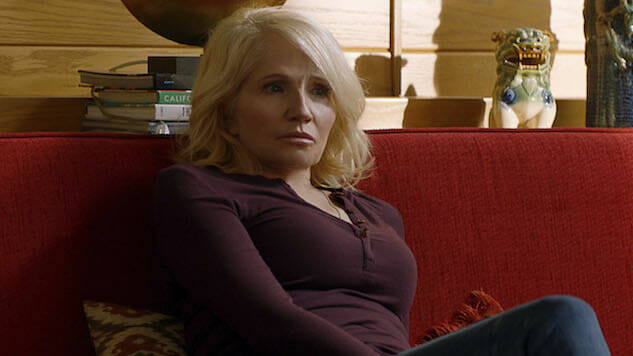In TNT’s Exhausting Animal Kingdom, the Outrageous Becomes Mundane
Image courtesy of Turner Entertainment
I was a latecomer to Animal Kingdom. It had promising-looking elements; some good actors, ruthless pacing, a certain unabashed toxicity that could maybe explode the pernicious dynamics of enmeshed, dysfunctional families into stark relief. It had a certain Sons of Anarchy meets John from Cincinnati vibe that looked like it had potential. Hell, it had Ellen Barkin. But it was slow to hook me. I wasn’t sure why, and I didn’t give it a lot of thought. So, with the launch of the second season upon us, I decided to start from the beginning and see if I could put my finger on it.
Anyone who happens to have been raised by a sociopath, a narcissist or a junkie (being all three can be a thing, too) already knows this: It is impossible to develop a normal attachment to such a person, and they tend to make it difficult if not impossible to develop normal attachments to anyone else, too. Janine Cody (Ellen Barkin), the jarringly-nicknamed matriarch “Smurf,” is so toxic she makes heroin look like lollipops. She’s a crime boss with a mafia consisting of four grown sons in varying states of sociopathy and dysfunction. She also has an estranged daughter.
In the promising first scene of the pilot, we see a teenaged boy watching TV in a sort of trance as paramedics come for his mother, who is dead of a heroin overdose on the couch next to him. He calls his grandmother, who comes to get him. Smurf is, from the first second she appears on screen, the polar opposite of everything the word “grandmother” conjures (unless you grew up in certain parts of my family…) and she is obviously insanely dangerous—the boy, J (Finn Cole) was better off doing his math homework while his mom lolled around in a dope-induced stupor. When Smurf takes him to her palatial beachfront pad and he sees his four adult uncles cavorting in the pool like a bunch of extra-large eighth-grade playground bullies, you know something extra-depraved is going on, and you get invested in whether J will sink into it, run away, subvert, resist, get killed… Whatever; it’s going to be something.
Interestingly, it’s not. Which is to say, it’s a series of minor bummers and disappointments and occasional attempts to be a kind of moral center, none of which exactly succeed or fail. In the end, as he explains to the police detective who wants him to rat them out, he’s a Cody. But he’s still a very ambivalent one.
The second season opener sees the four sons attempting to break free of Smurf’s Death Star-like sphere of influence, and there are a couple of interesting plotlines. Deran (Jake Weary) is trying to buy a bar; could the bullied underdog-doofus of the bunch possibly be making a play for a life in legitski-ville, and would the rest of the clan ever let it happen? Then there’s an escalating tension between Baz (Scott Speedman) and Pope (Shawn Hatosy) over the mysterious disappearance of Baz’s wife, Catherine (Daniella Alonso), and given that we know exactly where Catherine is, we definitely wonder which one of them’s going to crack first. Both have joined Smurf in using Catherine’s daughter Lena (Aamya Deva Keroles) as a pawn, which is effectively excruciating. But I don’t know: there is so much going on in Animal Kingdom, and yet so painfully little in the way of character development. Things that should be left to the viewer to make sense of are fed to us in really ham-fisted ways; Smurf is just about the only female character who seems to exist for any purpose other than taking her clothes off (not that the guys don’t have a comparable amount of naked-hiney time, but they also, theoretically, have a character arc). It veers from too much to not enough, over and over and over.